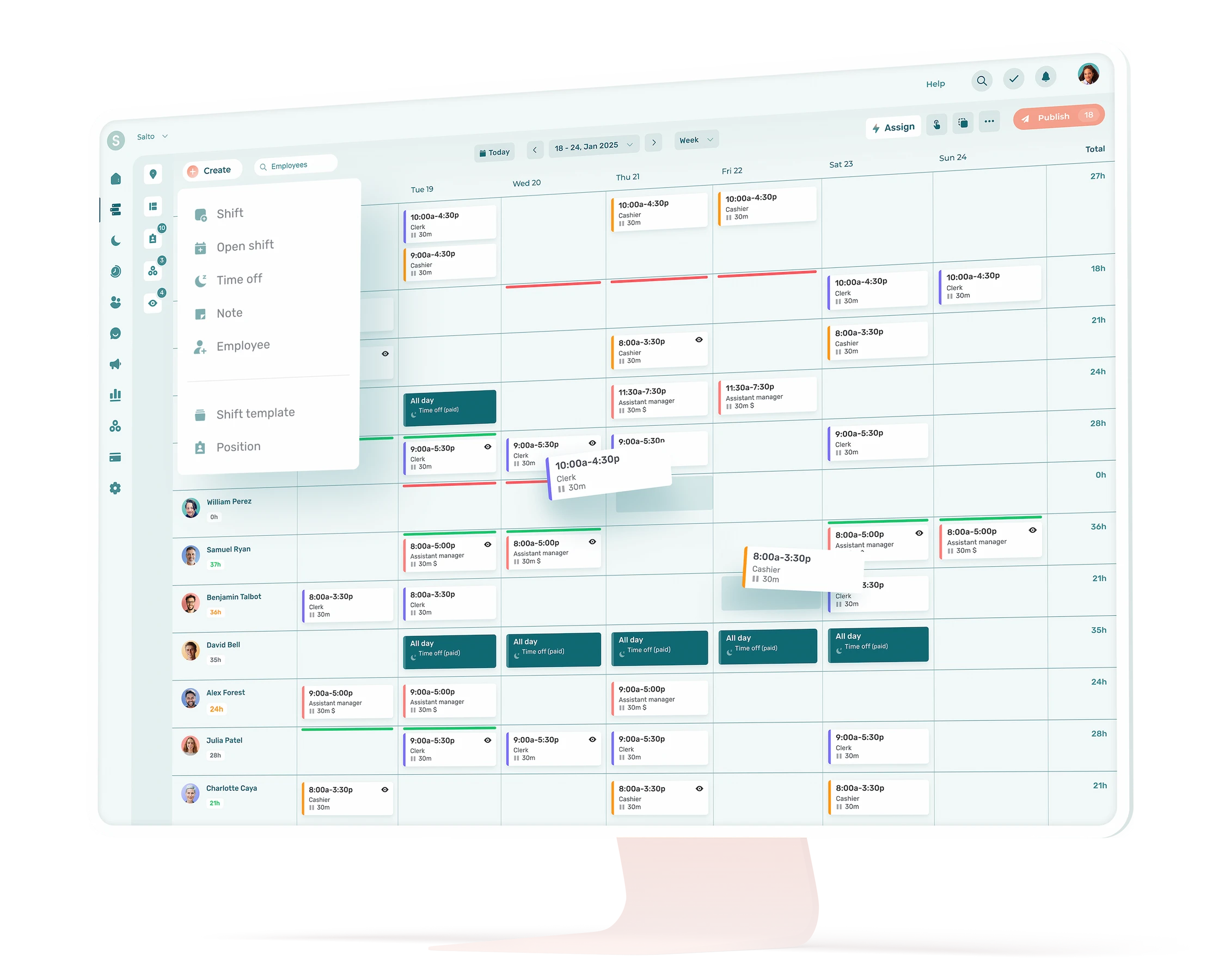The time has come to put an end to obsolete and unattractive job postings.
Your job posting is probably the first impression your future employees will have of you; you might as well as impress them.
A posting with a well-written job description is the first step to catching the eye of future candidates.
Check out our tips for writing an effective job posting.
Introduce Yourself
Your future employees want to know you. Take the time to introduce your business and clearly explain what you do.
People who are looking for a job are not just looking for a salary. They are also seeking a fulfilling environment.
To appeal to your future employees, give them some examples of your latest achievements. You can also talk about your mission and your values, or concretely explain what you do for your customers.
Examples
Bland, Boring and Overly Descriptive Section:
“Agendrix is a Sherbrooke-based company specializing in staff management. We help leaders simplify scheduling, manage timesheets and communicate with their employees. ”
More Catchy, Appealing and Motivating:
“Agendrix is first and foremost a team of technology lovers dedicated to redefining businesses’ work culture.
Our employee management app streamlines scheduling, time tracking and workplace communication.
Every day, we help more than 95,000 employees be more satisfied and engaged at work.
Our mission is to inspire more person-centred management. To fulfill this mission,
we seek to surround ourselves with the very best.”
Write a “No BS” Job Description
The job description is the most important section of your job posting. It must be clear and faithfully reflect what your future recruit will be called to do, and the knowledge and skills they will need in order to do so.
💡 Avoid leading off with: “We are looking for that rare candidate who can take care of… ”. This expression is so cliché that it’s become all but meaningless.
Name of the Position to Fill
Although your posting should be original, this isn’t the place to shoot for originality. Make sure the job title actually matches the tasks your employees will perform.
Forget about eccentric titles; no one is a customer service rock star or a sandwich ninja.
Some companies think that giving their employees original titles allows them to distinguish themselves. I disagree. On the contrary, it can make the company come off as being inauthentic.
Worse still, it makes keyword searches more difficult on job posting sites.
Tasks and Responsibilities
Your description of tasks and responsibilities is the core of your job offer.
Your candidates want to know what their main responsibilities will be, what their daily lives will be like, or what goals they will need to meet.
Be specific, avoid windy sentences, and don’t write something just to try to impress.
💡 Try to concretely describe the course of a normal day. If a task is not a regular task, leave it out. Period.
Requirements and Sought-After Qualities
Let’s get something straight—the ideal candidate does not exist.
While some skills are absolutely required for a job, others are learned. Keep this in mind when drawing up your list of requirements.
Looking for an employee who will be able to serve customers, take care of the coffee machines, handle inventory, manage social media and help you with accounting? You’re likely to be disappointed.
Focus first on the essential tasks, i.e., the ones that take years to master. You can gauge the candidate’s skill and interest in other tasks during the interview.
Personality is also very important when choosing a candidate, so clearly state the qualities needed to be part of your team: curiosity, a love of learning, the ability to work within short deadlines, autonomy, etc.
Law 14 and bilingualism: the need for clarity
The purpose of Law 14 is to protect and promote French as the official language in Quebec: it gives employees the right to carry out their professional activities in French, regardless of the workplace.
As an employer, this means you are no longer in a position to require proficiency in a specific second language other than French, EXCEPT where it is essential to achieve specific tasks.
If this is your case, you must be able to clearly justify your requirements. So it’s in your best interest to get the facts right when writing your job offers!
Moreover, if poorly explained, a candidate can submit a complaint to the Office québécois de la langue française. Notes may be added to your company file, and corrections may be required by the OQLF.
Here are a few examples of good and bad reasons for requiring bilingualism in a job offer:
- 15% of our customers are English-speaking, and the employee will need to be able to respond to their requests in English ✅
- The position requires working with out-of-province partners who do not speak French ✅
- Some irreplaceable software is only available in English ✅
- In the team, employees often speak to each other in English ❌
Of course, once hired, employees can decide which language they wish to use at work.
Did you know? In Quebec, as of June 1, 2023, all employers are required by law to provide multiple documents in French first, such as employment application forms as well as training documentation relating to working conditions.
Give a Salary Range
Too many companies continue to hold back from posting salaries in their job postings.
Wording such as “according to the established salary range” does NOT count!
Let’s be real: pay is important.
By omitting this information, you are wasting both your time and your potential candidate’s.
Imagine that you think you’ve found the perfect candidate. But when you make your offer, they turn it down. They consider the proposed salary too low. Unfortunately, your budget does not allow you to offer a better one. Now you have to start the whole process over again.
Show All That You Have to Offer
A job posting is a bit of a charm offensive. Candidates should want to come over and work with you.
In addition to the salary, tell them about the conditions you offer: insurance, RRSP contributions, sports budget, monthly team activities, team retreats, etc.
Are you a small business that can’t afford many perks? Emphasize your flexible schedules, relaxed work environment, opportunities for advancement, etc.
The goal here is to promote your business culture.
Don’t Forget to Tell People How to Apply
Clearly tell candidates how to apply for the job. Be straightforward.
Clarify what you want them to send you: resumé, cover letter, references, introductory video, etc.
This part of your job posting doesn’t have to be boring. You can throw in a dash of creativity.
Examples
Eyes-Glazing-Over:
Send us a cover letter and your resumé at [email protected].
More Appealing:
“Forget about the conventional wording suggested in cover letter templates plastered all over the Internet. We’d love for you to tell us a little more about you, and be yourself.
- What do you like in a work situation (tasks, atmospheres, working relationships, etc.)?
- What motivates you outside of work (passions, sports, cooking, travel, etc.)?
- Do you have examples of professional achievements or projects that would be worth sharing (related to the role)?
Feel free to send it in video format (no need for anything fancy)—we’ll be delighted!”
Writing an Original Job Posting Pays Off
In sum, writing appealing job postings will boost your chances of attracting the candidates of your dreams.
Don’t be afraid to do things a little differently in order to stand out from other companies.
And last but not least, don’t forget to proofread the posting for language errors. 😉










